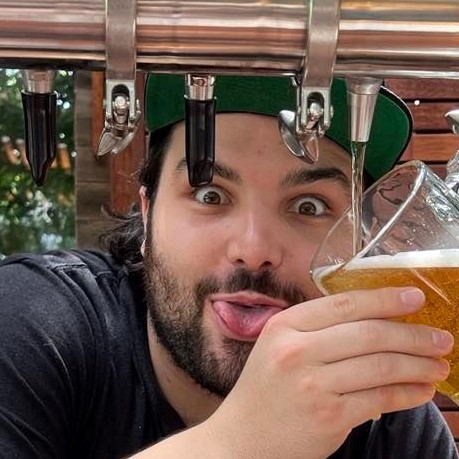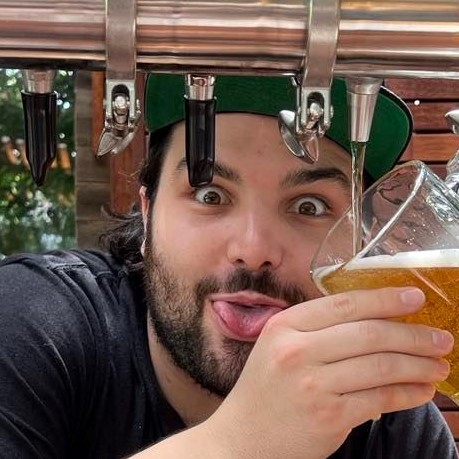Tropical Juice bomb Hazy IPA (NEIPA)
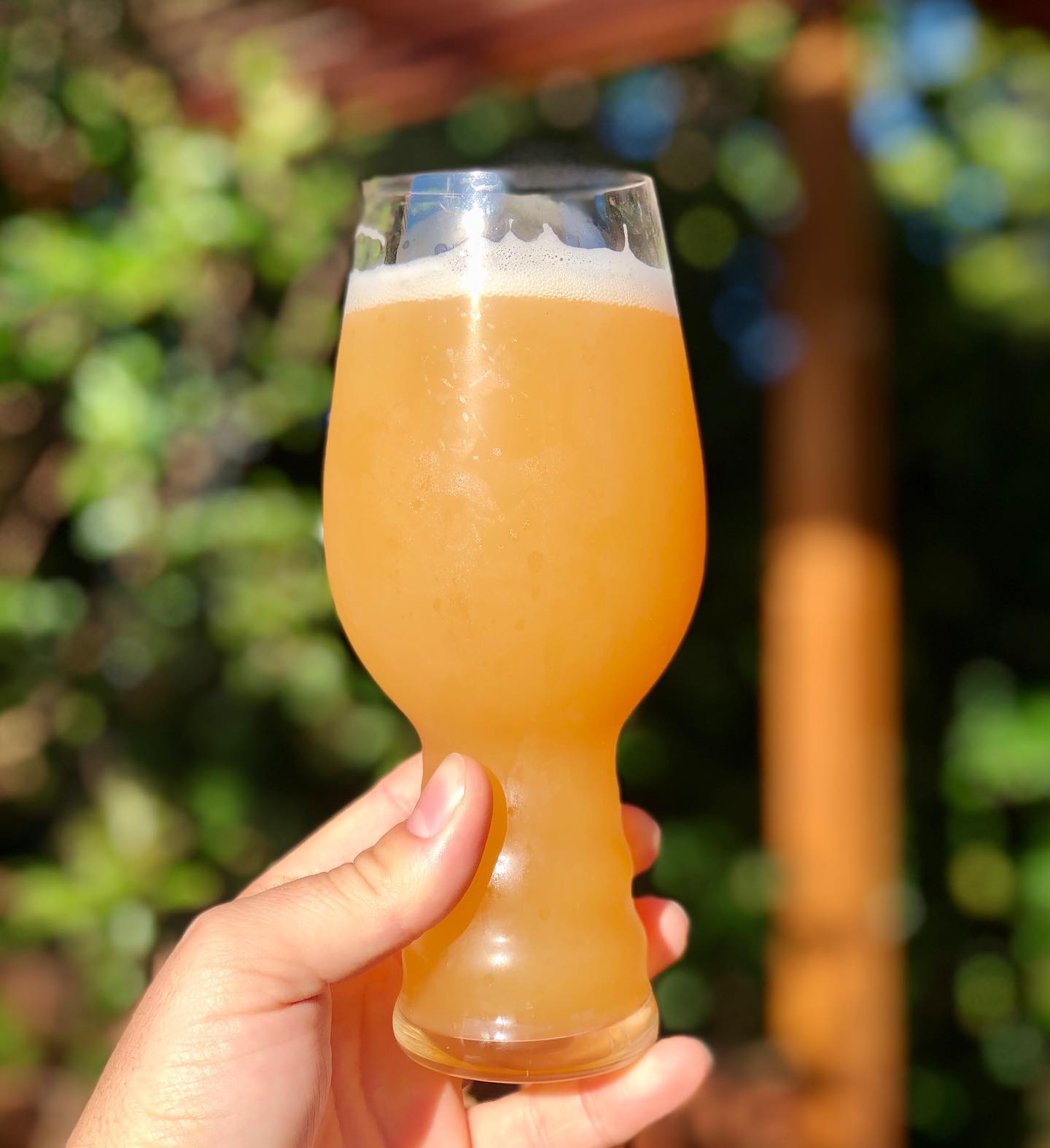
So... What is it?
The New England India Pale Ale (NEIPA) is a super fruity low bitterness style of IPA that typically sits around the 5.5-7.5% ABV mark. This particular recipe makes a 6.5% tropical juice bomb of a beer, with big flavors and aromas of mango, peaches, guava, orange, pineapple, and a touch of watermelon, lychee, and candy-like sweetness! If you haven't brewed a NEIPA before or just wanted to know what ingredients go into brewing a NEIPA, this is the guide for you!
Batch Size & ABV
38L (2 19L corny kegs) / 10 gal finished beer
50L (13.2 gal) wort
For a smaller 19L (5 gal) batch size simply half the ingredients of this recipe
Starting gravity – 1.063
Final gravity 1.013
ABV – 6.5%
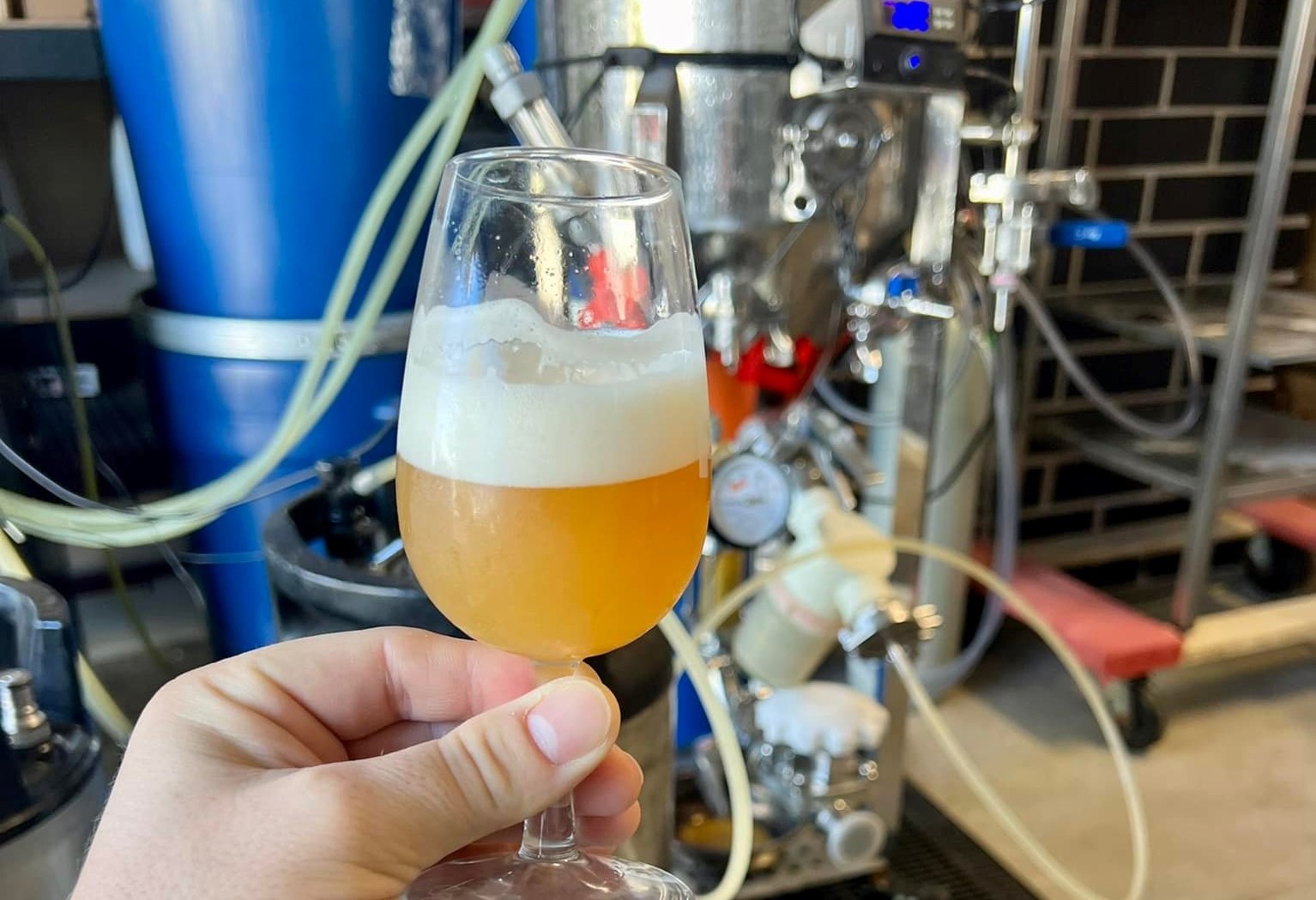
Ingredients
Water
- With sparging
- 30L (7.9 gal) strike water approx. 75°C (167°F) use this calculator to determine your strike water starting temp for a 69°C (156°F) mash https://chasethecraft.com/calculators
- 30L (7.9 gal) sparge water at 78°C (172°F)
- Without sparging
- 60L (7.9 gal) strike water approx. 74°C (165°F) use this calculator to determine your strike water starting temp for a 69°C (156°F) mash https://chasethecraft.com/calculators
Malts:
- Pale ale malt – 7.7kg (17 lb)
- Wheat Malt – 1.65kg (3.6 lb)
- Rolled Oat – 1.1kg (2.4 lb)
- Crisp Cara Gold (light caramalt) – 550g (1.2 lb)
- Rice Hulls (not necessary, just helps with sparging) – 550g (1.2 lb)
Hops & whirlfloc tablets
Galaxy
- 10g (0.35 oz) - 60 minutes left in the boil
Lupomax El Dorado
- 40g (1.4 oz) – whirlpool for 20 minutes at 75°C (167°F)
- 65g (2.3 oz) - Dry hop at gravity 1.017 (approx. day 6-10 depending on your yeast)
Lupomax Mosaic
- 40g (1.4 oz) – whirlpool for 20 minutes at 75°C (167°F)
- 65g (2.3 oz) - Dry hop at gravity 1.017 (approx. day 6-10 depending on your yeast)
Lupomax Sabro
- 40g (1.4 oz) – whirlpool for 20 minutes at 75°C (167°F)
- 65g (2.3 oz) - Dry hop at gravity 1.017 (approx. day 6-10 depending on your yeast)
Lupomax Amarillio
- 40g (1.4 oz) – whirlpool for 20 minutes at 75°C (167°F)
- 65g (2.3 oz) - Dry hop at gravity 1.017 (approx. day 6-10 depending on your yeast)
- Whirlfloc tablets
- 2 tablets – 15 minutes left in the boil
Yeast options & fermentation temperatures
- 23g (0.8 oz) Kveik (we used a Omega yeats Espe Kveik, but any kveik is great!) ferment at 32°C
- 23g (0.8 oz) US-05 – ferment at 20°C
- 23g (0.8 oz) S-04 – ferment at 19°C
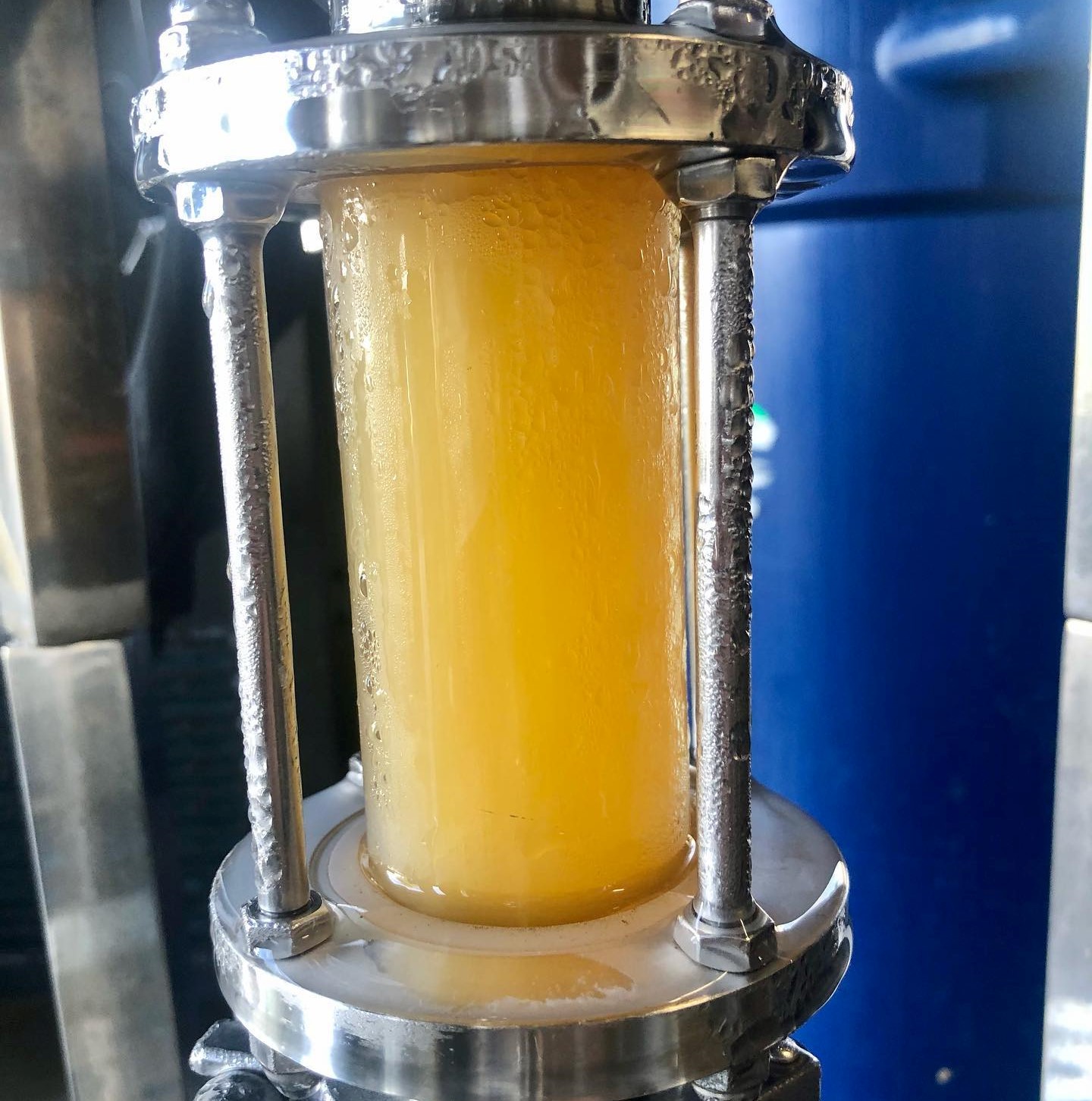
Step by step process
Step 1 – Milling
- Mill grains to medium crush (set mill rollers to a gap of approx. 1mm / 0.039 inches)
- Just keep in mind roller gap settings are not universal so as you brew more batches you will find the ideal crush size for your setup
- Alternatively if you don’t have a grain mill you can order your grains crushed from most homebrew stores, both online and in person
Step 2 – Mashing
- Mash for 60 minutes at 69°C (156°F)
- Set your strike water to a few degrees above the target mash temperature, you can use this calculator to determine what your strike temperature should be https://chasethecraft.com/calculators
- ensure you mix in the grains thoroughly with a mash paddle to prevent dough balls from forming (big spoons, spatulas or whisks will also work)
- its easier to mash the grains and prevent dough balls if you add a little grain at a time, mix, add more grain and repeat until all the grains are mixed
- if you don’t have a mash tun with heating then ensure after you have finished mixing the grains in to insulate your mash tun (thick neoprene or heavy blankets both work well)
Step 3 (optional) – Sparging
- if your setup has the capability to sparge then do so with 30L (7.9 gal) of sparge water at 78 °C (172°F)
- if you are not sparging and using a BIAB (brew in a bag) method then remove grains from mash tun and twist and squeeze the bag to get as much liquid out of the grains as possible
- as you start sparging (or straining your BIAB bag) begin raising the temperature of your wort to a boil
Step 4 – Boiling
- once your wort begins to boil start a timer for a 60-minute boil and add your bittering hops, 10g (0.35 oz) of Galaxy
- at 15 minutes left in the boil add 2 whirlfloc tablets
- after 60 minutes of boiling turn of the heat and chill the temperature of the wort down to 75°C (167°F) and begin whirlpooling
- if you don’t have a wort chiller you could rest your boil kettle in an ice bucket
- if your system can’t whirlpool you can also achieve this with a mash paddle and a power drill, if you don’t have this either don’t worry about whirlpooling it’s not completely necessary
Step 5 – Whirlpooling / whirlpool hop additions
- once temperature reaches 75°C (167°F) and you have started whirlpooling add your whirlpool hops, 40g (1.4 oz) each of Lupomax versions of Mosaic, Amarillo, Sabro and El Dorado
- allow hops to whirlpool in the wort for 20 minutes and then begin chilling wort again down to yeast pitching temperature
- once you’ve reached yeast pitching temperature take an original gravity reading of your wort
Step 6 – Yeast Pitching
- It is best to make a yeast starter before beginning your brew day (ideally 1 day before) to ensure your yeast are as active and healthy as possible before pitching, but not completely necessary – you could also just rehydrate yeast 30 minutes before pitching.
- Pitch yeast in wort a degree or two higher than the target fermentation temperature to help yeast take off more aggressively
- To make a yeast starter you can use either:
- DME (dry malt extract) at a ratio of approx. 100g per 1L water (3.5 oz per 33 fluid ounces) for gravity of approx. 1.040
- some unfermented wort kept cold and sanitary from a previous brew day
- 70g of table sugar per 1L water (2.5 oz per 33 fluid ounces) – however, it is best to use malt sugar (wort / DME) whenever possible to reduce the chance of shocking the yeast with a different food source from starter to wort pitching
- To rehydrate yeast
- Add yeast to approx. 10 times as much room temperature water as the weight of the yeast e.g. 10g yeast in 100 ml water (0.35 oz yeast in 3.5 fluid ounces water)
Step 7 – Fermentation & dry hopping
- Allow yeast to ferment over the next week to two weeks
- If you have a temperature-controlled system keep the fermenter temperature to the recommended fermentation temperature for each yeast strain (stated in the yeast ingredients section above)
- Monitor the fermentation activity over the first 7 days by the bubbling of the blow-off tube/airlock of your fermenter, as the bubbling slows down (roughly around day 7) take a gravity reading. When the gravity reaches around 1.014 raise the temperature of your fermenter by 1-2 degrees for 2 days for a diacetyl rest (if you don’t have temperature control don’t worry about this step, it's not the end of the world!)
- It's important to note that fermentation times will vary based on your circumstances like temperature, amount of yeast pitched, the healthiness of yeast, the gravity of the wort, pH, etc. so don’t stress be patient and know that these times are just a rough guide
- On day 2 of the diacetyl rest (once gravity reaches roughly 1.015 – 1.017) add 65g (2.3 oz) each of Lupomax versions of Mosaic, Amarillo, Sabro, and El Dorado
- One day after dry hopping take a gravity reading, fermentation should finish at about 1.013, if you haven't reached this yet wait another day and take another reading, once the gravity is the same 2 days in a row move onto cold crashing! (If you can’t / don’t want to cold crash go straight to kegging/bottling your beer!)
Step 8 (optional) – Cold crashing
- begin cold crashing your fermenter (bring the temperature of your fermenter down to as close to 0°C (32°F) as possible, for 2 days to a week depending on how patient you are
- If you don’t have a temp-controlled fermenter, you can cold crash by putting your fermenter in a fridge or temp-controlled chest freezer
- After you have finished cold crashing it's time to keg/bottle your beer! If you are bottling your beer from the fermenter uncarbonated remember to add about 5-7 grams (0.17 - 0.24 oz) of priming sugar to your bottles to carbonate your beer.

